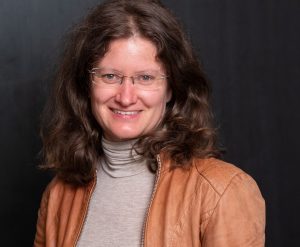Felicitas Mokler – Journalist in Residence 2024

German science journalist and author Felicitas Mokler was the 12th “Journalist in Residence” at the Heidelberg Institute for Theoretical Studies (HITS). She joined the institute in April 2024 and stayed for six months.
During her time at HITS she visited various institutions and editorial offices, gave lectures in Heidelberg, Nuremberg, Berlin, and Nebra, and held an internal seminar for HITS scientists on the topic of science communication. At the end of her stay, she gave a lecture in German at the Mathematics Informatics Station (MAINS) in Heidelberg on journalism and artificial intelligence.
Why did she apply for this program? “I heard about the program some time ago, and found it really interesting,” says Felicitas Mokler. “So far, I have mostly written about (astro)physics, and I like to delve deep into topics. As Journalist in Residence, you are free to choose your own project, which can be independent of the research done at HITS, although the institute covers a wide range of subjects – a great basis to learn and to connect with scientists working at the forefront of research.”
As a doctoral student, she was already deeply involved in the communication of scientific content. In 2008, she won the KlarText Prize for Science Communication from the Klaus Tschira Foundation in the field of physics. She then worked as a press officer at Max Planck Institutes, as an editor, and as a freelance science journalist. In future, she will pass on her knowledge about science communication as a lecturer at the National Institute for Science Communication (NaWik).
“I will especially miss the time and freedom to draw on the plentiful resources. No matter where in the world, this is becoming increasingly difficult in freelance journalism. Through this program, I was able to further my knowledge. This will enable me to act quickly in other fields and reflect on new things on a different level.”
She adds, “Time flies. My main advice is to approach things with an open mind and be receptive to new topics and perspectives.”
About HITS
HITS, the Heidelberg Institute for Theoretical Studies, was established in 2010 by physicist and SAP co-founder Klaus Tschira (1940-2015) and the Klaus Tschira Foundation as a private, non-profit research institute. HITS conducts basic research in the natural, mathematical, and computer sciences. Major research directions include complex simulations across scales, making sense of data, and enabling science via computational research. Application areas range from molecular biology to astrophysics. An essential characteristic of the Institute is interdisciplinarity, implemented in numerous cross-group and cross-disciplinary projects. The base funding of HITS is provided by the Klaus Tschira Foundation.